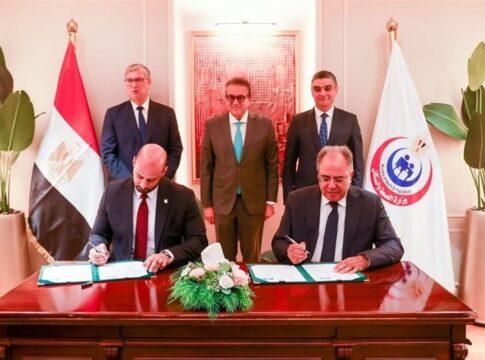Egypt has taken a major step toward building a self-sustaining medical technology sector through a newly signed cooperation protocol with Dutch multinational Philips. The deal is part of a broader strategy to localize biomedical manufacturing and reduce reliance on imports, the Ministry of Health and Population announced.
The agreement—inked in the presence of Minister of Health and Population Dr. Khaled Abdel-Ghaffar, Unified Procurement Authority head Dr. Hisham Stait, and Dutch Ambassador Peter Mollema—includes feasibility studies, component development, and the launch of Egypt’s first biomedical engineering knowledge transfer center.
According to ministry spokesperson Dr. Hossam Abdel-Ghaffar, the partnership will also bolster Egypt’s domestic capacity to design, assemble, and maintain advanced medical devices—creating a sustainable pipeline for healthcare innovation. “This initiative is not just about localization—it’s about building a strategic national capability,” said Abdel-Ghaffar. “By transferring critical know-how and working with one of the world’s leading medical technology innovators, we’re laying the foundation for future resilience.”
The move comes on the heels of President Abdel-Fattah El-Sisi’s public declaration that Egypt’s top investment priorities include medical devices, telecom, AI, and pharmaceuticals—a vision echoed across multiple ministries.
“Healthcare sovereignty is now a national imperative,” said healthcare policy analyst Dr. Rania Tarek. “This partnership aligns with the state’s economic and public health goals by reducing import dependence and cultivating local tech ecosystems.”
Philips’ role in the agreement is significant. In 2023, the company filed 607 patent applications in medical technology—ranking second in the European Patent Office (EPO) index for the sector. With a track record of innovation, the company is expected to bring technical expertise, investment confidence, and a global R&D outlook to the Egyptian healthcare landscape.
A senior official familiar with the deal told The Middle East Observer that the partnership may pave the way for joint ventures, training programs, and R&D hubs tailored for North Africa and the Middle East.
The forthcoming Biomedical Engineering Knowledge Transfer Center will serve as a regional anchor for training engineers, developing device components, and conducting localized feasibility assessments for production lines. The center will also support ongoing education in biomedical technologies—a gap long identified by local universities and hospitals.
The first wave of pilot initiatives under the protocol is expected to roll out within 6–12 months, according to ministry sources.


